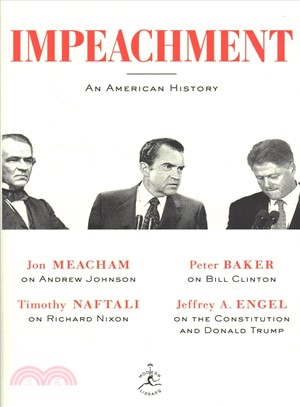Impeachment ― An American History
商品資訊
ISBN13:9781984853783
出版社:Modern Library
作者:Jeffrey A. Engel; Jon Meacham; Timothy Naftali; Peter Baker
出版日:2018/10/02
裝訂/頁數:精裝/160頁
規格:19.1cm*12.7cm (高/寬)
商品簡介
作者簡介
相關商品
商品簡介
Four experts on the American presidency review the only three impeachment cases from history--against Andrew Johnson, Richard Nixon, and Bill Clinton--and explore its power and meaning for today.
Impeachment is rare, and for good reason. Designed to check tyrants or defend the nation from a commander-in-chief who refuses to do so, the process of impeachment outlined in the Constitution is what Thomas Jefferson called "the most formidable weapon for the purpose of a dominant faction that was ever contrived." It nullifies the will of voters, the basic foundation of legitimacy for all representative democracies. Only three times has a president's conduct led to such political disarray as to warrant his potential removal from office, transforming a political crisis into a constitutional one. None has yet succeeded. Andrew Johnson was impeached in 1868 for failing to kowtow to congressional leaders--and in a large sense, for failing to be Abraham Lincoln--yet survived his Senate trial. Richard Nixon resigned in July of 1974 after the House Judiciary Committee approved three articles of impeachment for lying, obstructing justice, and employing his executive power for personal and political gain. Bill Clinton had an affair with a White House intern, but in 1999 faced trial in the Senate less for that prurient act than for lying under oath about it.
In the first book to consider these three presidents alone, and the one thing they have in common, Jeffrey Engel, Jon Meacham, Timothy Naftali, and Peter Baker explain that the basis and process of impeachment is more political than it is a legal verdict. The Constitution states that the president, "shall be removed from Office on Impeachment for, and Conviction of, Treason, Bribery, or other high Crimes and Misdemeanors," leaving room for historical precedent and the temperament of the time to weigh heavily on each case. These three cases highlight factors beyond the president's behavior that impact the likelihood and outcome of an impeachment: the president's relationship with Congress, the power and resilience of the office itself, and the polarization of the moment. This is a realist, rather than hypothetical, view of impeachment that looks to history for clues about its future--with one obvious candidate in mind.
Impeachment is rare, and for good reason. Designed to check tyrants or defend the nation from a commander-in-chief who refuses to do so, the process of impeachment outlined in the Constitution is what Thomas Jefferson called "the most formidable weapon for the purpose of a dominant faction that was ever contrived." It nullifies the will of voters, the basic foundation of legitimacy for all representative democracies. Only three times has a president's conduct led to such political disarray as to warrant his potential removal from office, transforming a political crisis into a constitutional one. None has yet succeeded. Andrew Johnson was impeached in 1868 for failing to kowtow to congressional leaders--and in a large sense, for failing to be Abraham Lincoln--yet survived his Senate trial. Richard Nixon resigned in July of 1974 after the House Judiciary Committee approved three articles of impeachment for lying, obstructing justice, and employing his executive power for personal and political gain. Bill Clinton had an affair with a White House intern, but in 1999 faced trial in the Senate less for that prurient act than for lying under oath about it.
In the first book to consider these three presidents alone, and the one thing they have in common, Jeffrey Engel, Jon Meacham, Timothy Naftali, and Peter Baker explain that the basis and process of impeachment is more political than it is a legal verdict. The Constitution states that the president, "shall be removed from Office on Impeachment for, and Conviction of, Treason, Bribery, or other high Crimes and Misdemeanors," leaving room for historical precedent and the temperament of the time to weigh heavily on each case. These three cases highlight factors beyond the president's behavior that impact the likelihood and outcome of an impeachment: the president's relationship with Congress, the power and resilience of the office itself, and the polarization of the moment. This is a realist, rather than hypothetical, view of impeachment that looks to history for clues about its future--with one obvious candidate in mind.
作者簡介
Jeffrey A. Engel is an award-winning American history scholar and director of the Center for Presidential History at Southern Methodist University.
Jon Meacham is a Pulitzer Prize-winning and New York Times bestselling presidential historian.
Timothy Naftali is a clinical associate professor of public service and a clinical associate professor of history at NYU Wagner.
Peter Baker is the senior White House correspondent for The New York Times and author of three books.
Jon Meacham is a Pulitzer Prize-winning and New York Times bestselling presidential historian.
Timothy Naftali is a clinical associate professor of public service and a clinical associate professor of history at NYU Wagner.
Peter Baker is the senior White House correspondent for The New York Times and author of three books.
主題書展
更多
主題書展
更多書展今日66折
您曾經瀏覽過的商品
購物須知
外文書商品之書封,為出版社提供之樣本。實際出貨商品,以出版社所提供之現有版本為主。部份書籍,因出版社供應狀況特殊,匯率將依實際狀況做調整。
無庫存之商品,在您完成訂單程序之後,將以空運的方式為你下單調貨。為了縮短等待的時間,建議您將外文書與其他商品分開下單,以獲得最快的取貨速度,平均調貨時間為1~2個月。
為了保護您的權益,「三民網路書店」提供會員七日商品鑑賞期(收到商品為起始日)。
若要辦理退貨,請在商品鑑賞期內寄回,且商品必須是全新狀態與完整包裝(商品、附件、發票、隨貨贈品等)否則恕不接受退貨。
























